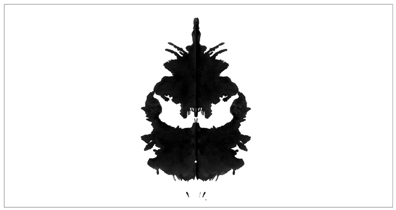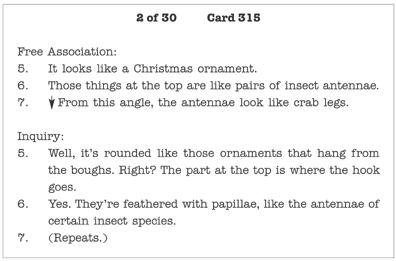Death Match (7 page)
Authors: Lincoln Child

Lash looked at him. “What?”
“Ms. Thorpe. When they came into the consultation room, she apologized for being late. On the way here, she refused to take the first cab they hailed because the driver was blaring opera from his radio. She said she couldn’t stand it. Took them ten minutes to find another.” He shook his head at the memory. “They were laughing about it.”
He nodded to Lash, then Mauchly, and left the room.
Mauchly turned, spectral in the glow of the rooms below, and raised a bulky manila envelope. “The results of the Thorpes’ inkblot tests, administered during their evaluations. It’s the only test we give that isn’t proprietary, that’s why I am able to share it.”
“Big of you.” Frustration gave an edge to Lash’s voice he didn’t intend.
Mauchly regarded him mildly. “You must understand, Dr. Lash. Our interest in what happened to the Thorpes is as a case study only. This is a tragic event, one that’s especially painful to us because a supercouple was involved. But it’s an isolated occurrence.” He handed the folder to Lash. “Look these over at your convenience. It’s our hope you’ll continue to investigate, search for any personality issues we should keep in mind for future evaluations. But if you still want to quit the job, we’ll accept the brief you’ve already prepared. In any case, the money is yours to keep.” He gestured toward the door. “And now, with your permission, I’ll see you back to the lobby.”
EIGHT
T
he afternoon shadows were lengthening when Lash pulled into the Greenwich Audubon Center, parked, and started down the wood-chipped path leading to Mead Lake. He had the place to himself: the school groups had left hours before, and the weekend birders and nature photographers wouldn’t gather until the weekend. The dampness of the morning had given way to limpid sunlight. Around him, open woodlands melted away into fastnesses of green and brown. The air was heavy with the scent of moss. As he walked, the traffic on Riversville Road grew fainter. Within minutes, it was replaced entirely by birdsong.
He had left the offices of Eden Incorporated intending to drive straight back to his Stamford office. The week he’d allowed for this assignment was up, and he now had to decide what, if anything, was to be done about next week’s arrangements. But halfway home he’d found himself leaving the New England Thruway and driving, almost aimlessly, through the shady lanes of Darien, Silvermine, New Canaan, the stomping grounds of his youth. The Thorpes’ inkblot tests lay, untouched, in an envelope on the passenger seat. He’d driven on, letting the car decide where to go. And it ended up here, at the nature preserve.
It seemed as good a place as any.
Ahead of him the pathway forked, leading to a series of bird blinds overlooking the lake. Lash selected one at random, climbed the short ladder into the boxlike structure. Inside it was warm and dark. A long horizontal slit at the rear offered a clandestine view of the lake. Lash peered out at the waterbirds, ducking and bobbing, oblivious to his presence. Then he took a seat on the wooden bench and placed the bulky manila envelope beside him.
He did not open it right away. Instead, he reached into a jacket pocket and pulled out a tiny volume:
Narrow Road to the Interior
, by Matsuo Bash–o. He’d seen copies for sale on the counter of a Starbucks in Sky Harbor International, and the coincidence seemed too great not to pick one up. He thumbed through the translator’s introduction, found the opening lines.
The moon and sun are eternal travelers. Even the years wander on. A lifetime adrift in a boat, or in old age leading a tired horse into the years, every day is a journey, and the journey itself is home.
He put the book aside. What had Lewis Thorpe said about the poetry of Bash–o: so dense, yet so simple? Something like that.
Lash had many professional rules, but the preeminent one was Keep your distance from your patients. It was a rule he’d learned the hard way, profiling at the FBI. So why had he allowed himself to become so fascinated with Lewis and Lindsay Thorpe? Was it simply the mystifying nature of their deaths? Or was there some special allure in the perfection of their marriage? Because by every account he’d been able to obtain, their marriage had, in fact, been perfect—right up to the moment they put dry- cleaning bags over their heads, embraced, and slowly lost consciousness in front of their infant daughter.
Normally, Lash did not permit personal introspection. It led nowhere, dulled his objectivity. But he decided to allow himself another observation. He had not chosen this place at random, after all. This sanctuary, this pathway—and, in fact, this very blind—had been the spot where, three years before, Shirley said she never wanted to see him again.
Every day is a journey, and the journey itself is home.
Lash wondered what kind of a journey the Thorpes had embarked on. Or for that matter, what kind of a journey he himself was undertaking to discover their secret. It was a journey his better judgment told him to resist even as his feet led him farther down the path.
He passed his hand wearily across his eyes, reached for the bulky envelope, and tore it open with a tug of his index finger.
Inside were just over a hundred sheets of paper: the results of Lewis and Lindsay Thorpe’s inkblot tests, administered by Eden during their application process.
As a high school student, Lash had been fascinated by inkblots; by the idea that seeing objects in random smudges could say something about you. It wasn’t until graduate school, when he studied test administration—and took the test himself, as all psych students were required to do—that he realized how profound a tool of psychodiagnosis it could be. Inkblots were known as “projective” tests because—unlike highly structured, objective written tests like the WAIS or MMPI—the concept of right and wrong was ambiguous. Looking for images in an inkblot required bringing deeper, complex areas of personality to bear.
Eden used the Hirschfeldt test, a choice Lash wholeheartedly approved. Though indirectly based on Exner’s refinement of the original Rorschach, the Hirschfeldt test had several advantages. There were only ten Rorschach inkblots, and these were kept secret by psychologists: it would be easy for a person to memorize the “right” responses to such a small number of blots. Each administration of the Hirschfeldt test, on the other hand, drew from a catalogue of five hundred catalogued blots—far too many to memorize. Thirty blots were shown, rather than ten, generating a deeper response pool from the subject. Unlike the Rorschach, where half of the inkblots were in color, all of the blots in the Hirschfeldt test were black and white; its supporters thought color to be an unimportant distraction.
Lindsay Thorpe’s test results came first. Lash paused a moment to imagine her in the examination room. It would be quiet, comfortable, free of distraction. The test administrator would be sitting slightly behind her; face-to-face examinations were to be avoided. Lindsay Thorpe would not see the inkblots until the moment the examiner laid them upon the table before her.
The ground rules of the test were as guarded as the blots themselves. Any question she asked would be met with a preformulated response. Lindsay would not know that
everything
she said about the blots, relevant or not, would be written down and scored. She would not know that her responses were being timed with a silent watch: the quicker her responses, the better. She would not know that she was supposed to see more than one thing in each card; seeing only one was suggestive of neurosis. And she wouldn’t know that—though the test administrator would deny it if asked—each card
did
in fact have a “normal” response. If you saw something original, and could justify it, you’d get points for creativity. But seeing something nobody else saw in an inkblot usually implied psychosis.
Lash turned to the first blot. Below it, the administrator had recorded Lindsay’s responses verbatim.

There were two steps to viewing each card: a free-association phase, where the subject stated his or her first impressions of the card, and an inquiry phase, where the examiner would ask the subject to justify their impressions. Lash noticed, from the arrow marked on the third free association, that Lindsay had on her own volition turned the card upside down and kept it that way. That was a sign of independent thinking: if you asked whether you could turn the card over, you got a lower score. Lash recognized this blot, and Lindsay had hit most of the typical responses: a mask, a bat. No doubt the examiner would have noted Lindsay’s reference to the devil, an extraneous remark that would need to be scored.
The next sheet in the pile was the examiner’s scoring sheet for this first card:

Lash quickly reviewed the way Lindsay’s four responses had been typed and scored. The examiner had done a thorough job. Despite the years since he’d last administered a Hirschfeldt test, the arcane codes came back to him:
B
stood for a response encompassing the whole blot;
D
for a response to a commonly noted detail. Human and animal forms, anatomy, nature, and the rest were all noted. In all four responses, Lindsay’s form factors had been marked
O
K: a good sign. She saw more images in the white spaces than usual, but not enough to cause any concern. In the “specials” category—where examiners listed deviant verbalizations and other no-nos—Lindsay received only one mark, MOR, for morbid content: no doubt for her characterization of the image as a “devil mask” and “scary.”
He moved on to the second blot:

Again, the examiner had carefully listed Lindsay’s responses.

Again, Lash recognized this blot. Lindsay Thorpe’s responses were all within normal.
Lash looked back idly at the blot. Suddenly, he stiffened. Completely unexpectedly, a series of associations flashed through his own mind as he stared: a quickly spreading sea of red across a white carpet; a dripping kitchen knife; the grinning mask of Edmund Wyre, handcuffed and in leg irons, as he was arraigned before a sea of shocked faces.
